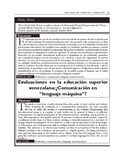| dc.rights.license | http://creativecommons.org/licenses/by-nc-sa/3.0/ve/ | es_VE |
| dc.contributor.author | Peña R., Erica H | |
| dc.date.accessioned | 2019-06-28T16:51:41Z | |
| dc.date.available | 2019-06-28T16:51:41Z | |
| dc.date.issued | 2019-06-28 | |
| dc.identifier.issn | 1316-7189 | |
| dc.identifier.uri | http://www.saber.ula.ve/handle/123456789/45865 | |
| dc.description.abstract | El presente artículo nace de una realidad observada desde dos puntos de vista: la del docente y la del estudiante. Al aceptar la evaluación como un mecanismo de comunicación, se debe considerar la manera en como el/la docente se comunica con sus estudiantes.Destacando que la praxis educativa es tan compleja como amplia, los resultados pueden ser óptimos, si existe una comunicación efectiva entre los participantes del proceso evaluativo, inclusive, entre docentes para compartir sus experiencias y métodos aplicados. Se presenta una realidad en la que docentes, formados por un modelo denominado tradicional, lo mantienen en sus estudiantes, creándose una continuidad inmersa en una resistencia a los cambios, a pesar del surgimiento de nuevos métodos, así como de la incorporación de las tecnologías de la información y comunicación con sus múltiples beneficios y transformaciones en todo quehacer humano. La cuestión está, en que muchas y muchos docentes dicen que no lo practican pero la realidad es otra, llevando a que las evaluaciones se presenten como un mecanismo altamente riguroso, clasificatorio, incluso genere incertidumbre en la y el estudiante al momento de abordarla porque el lenguaje que se utiliza genera confusión e incomprensión, semejante al lenguaje máquina. | es_VE |
| dc.language.iso | es | es_VE |
| dc.publisher | SaberULA | es_VE |
| dc.rights | info:eu-repo/semantics/openAccess | es_VE |
| dc.subject | Evaluación | es_VE |
| dc.subject | comunicación | es_VE |
| dc.subject | lenguaje | es_VE |
| dc.subject | transformación | es_VE |
| dc.title | Evaluaciones en la educación superior venezolana: ¿Comunicación en “lenguaje máquina”? | es_VE |
| dc.title.alternative | Evaluations in Venezuelan higher education: Communication in "machine language"? | es_VE |
| dc.type | info:eu-repo/semantics/article | es_VE |
| dcterms.dateAccepted | diciembre 2018 | |
| dcterms.dateSubmitted | septiembre 2018 | |
| dcterms.dateSubmitted | septiembre 2018 | |
| dc.description.abstract1 | This article is born from a reality observed from two points of view: teacher and student. When accepting the evaluation as a communication mechanism, one must consider the way in which the teacher is communicating to his students. Emphasizing that the educational praxis is as complex as wide, results can be optimal, if there is an effective communication among the participants of the evaluation process, including, among teachers to share their experiences and applied methods. It presents a reality in which teachers, trained by a traditional model, keep it in their students, creating a continuity immersed in a resistance to change, despite the emergence of new methods, as well as the incorporation of the technologies of information and communication with its multiple benefits and transformations in all human activities. The question is, in which many teachers say they do not practice it but the reality is different, leading to the evaluations are presented as a highly rigorous, classifying mechanism, even generate uncertainty in the student and to address it because the language that is used generates confusion and incomprehension, similar to machine language for those who do not handle it. | es_VE |
| dc.description.colacion | 23-30 | es_VE |
| dc.description.email | erica.uni31@gmail.com | es_VE |
| dc.description.frecuencia | anual | |
| dc.identifier.depositolegal | 199702ME265 | |
| dc.identifier.eissn | 2244-8799 | |
| dc.publisher.pais | Venezuela | es_VE |
| dc.subject.centroinvestigacion | Centro de Investigaciones en Lenguas Extranjeras (CILE) | |
| dc.subject.facultad | Facultad de Humanidades y Educación | es_VE |
| dc.subject.keywords | Evaluation | es_VE |
| dc.subject.keywords | communication | es_VE |
| dc.subject.keywords | language | es_VE |
| dc.subject.keywords | transformation | es_VE |
| dc.subject.publicacionelectronica | Entre Lenguas | |
| dc.subject.seccion | Entre Lenguas: Artículos | es_VE |
| dc.subject.thematiccategory | Artes y Humanidades | es_VE |
| dc.subject.tipo | Revistas | es_VE |
| dc.type.media | Texto | es_VE |



